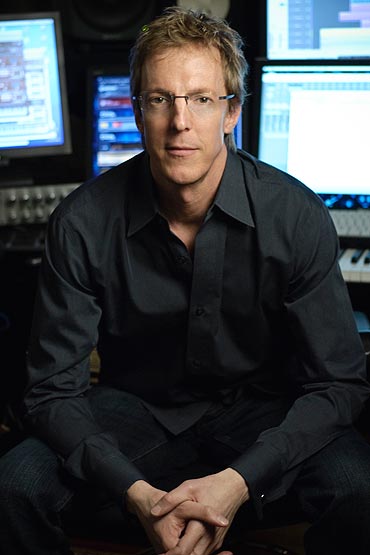
American musician Wayne Sharpe started his film career working on indies including Southie (Donnie Wahlberg and Amanda Peet) and Pigeonholed (Chris Noth and Rosanna Arquette).
He worked on commercials and television sports shows. Then a chance meeting with Indian filmmaker Prakash Jha changed his life. Sharpe has composed background score for four of Jha's films (Gangaajal for which he won a Filmfare award, Apaharan, Raajneeti and now Aarakshan).
Along the way he has composed music for three other Indian films Hope and a Little Sugar, Lahore and the just completed Circus.
Aseem Chhabra met Sharpe in his studio in Jersey City (with a framed Raajneeti poster up on the wall), where the musician talked about his collaboration with Jha.
He played some of the compositions from Aarakshan and even a brief piece of Jha singing a melody that Sharpe had recorded on his iPod.
How did you meet Prakash Jha?
I met him here in New York through (a common friend) Gopi Sait. Prakash was visiting New York for a film festival and Gopi said to Prakash 'I have a music guy you should meet and listen to his music.' So he came to my studio and we hit it off creatively. And then he asked me to come and work on Gangaajal.
You just did the score or songs also?
Yes, the score. I think there was only song in the film. I got to work with Ustad Sultan Khan.
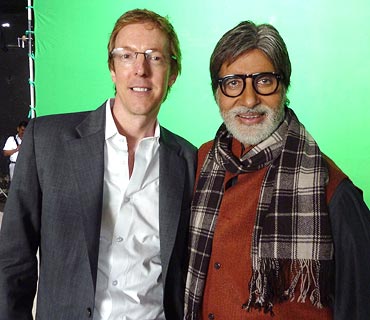
For Raajneeti, you actually composed a song and worked on the entire soundtrack.
Yeah. I attempted my first Bollywood song Dhan Dhan Dharti for Raajneeti. And I did the whole score. Gulzar (the lyricist for the song) was great and he explained the lyrics to me. Shankar (Mahadevan) sang the song.
Why do you think Prakash Jha likes to work with you? What do you bring to the table for him?
I have a western approach to the music. I have spent time in India, so I know the culture and I can fuse the two. I think what Prakash wants is a western sound, but with Indian instruments. We have done four films now so we know each other's style and I know what he wants. We have a good working thing going. He comes here and that's the crucial part where we go through the whole film over three-four days, very, very meticulously and he will talk to me about the whole story.
What were the challenges of working on Raajneeti?
The hardest thing for me was to keep track of so many different names of characters from the film and there were three families. So I asked for a flow chart of all the characters, since the families were also interlaced. It was very complicated, the three tree hierarchy of relationships.
In Raajneeti, I had 13 different themes. When Arjun's (Rampal) character was with Katrina (Kaif), and they weren't in love yet, we had a kind of an empty love theme. But when they fell in love, we had a full blown love theme. It was a very intricate score.
When we got to Aarakshan, it was much easier. In Aarakshan, it is about three or four characters and maybe eight themes.
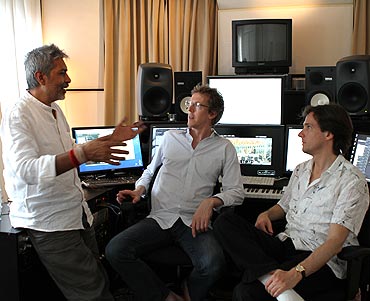
So when you started to work on Aarakshan, what directions did Prakash give you?
He talked to me on the phone and explained that the film was about the reservation system, the politics around it and that Amitabh Bachchan was in it.
You know about the affirmative action and the reservation system in India?
Yes, I have been away from India for some time but I am fully aware of it. While it started with good intentions to help people who belong to lower castes in the Hindu system, who were also economically deprived, some people think it is reverse discrimination against people who are qualified. I know there are so many different perspectives in India. Prakash addresses that in Aarakshan. He loves controversy, but this film has such a balanced perspective. He addressed both sides.
He flew over here, he brought the whole film and we sat down and watched it. It took three days to break down the film, while he took me through every detail, where he wanted the music.
He's a season filmmaker and that makes it very easy. I shot about eight hours of video tapes in case, after he left, I wanted to revisit what he had said. Also, this time it was easier since he subtitled the film. The other films were not subtitled so for me, I had to remember every detail.
And he developed the themes. He sang the Vaishnav Jan To notes for me. I have it here in my iPod (he plays it). But it was very complicated for western notes and to play it on the piano. We spent a day composing it. It was important for me that the Indian audience recognise it, although it had to be subtle. And this was Prabharkar's (Bachchan's character) theme.
But we changed the whole sound. The one piece that is Deepak's (Saif Ali Khan's character) theme, and it became the theme of the larger caste conflict. I wanted something different in the sound. I said to Prakash, 'I don't want anything like in Raajneeti. Let me try something from the south of the United States, like the blues.' One night I woke up and started playing the guitar sitting here and the theme evolved.
So you do your compositions here and then you take the music to India?
Yes.
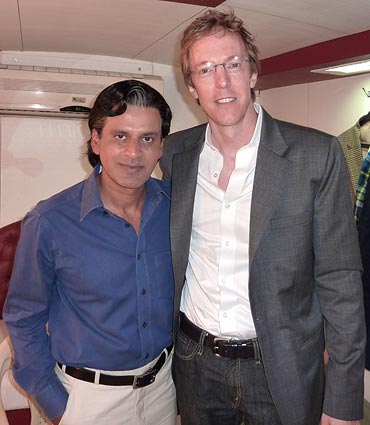
Do you know the musicians?
I met the musicians though Yogesh Pradhan, an arranger over there. He helps hire the musicians. I ask him I want the best flautist or the sarod player.
Can you talk about your experience working with the musicians in India?
I was humbled by the musicians there. Not only they can play but their musical memories of melodies and timings are very impressive. And the melodies and their meters are far more complicated than in the west.
I know you have worked on soundtracks for American indie films. What is the difference there and then working for a Bollywood film?
First of all, there are songs in Indian films and you have to incorporate them. Also in Indian films, there is two-to-three times more music. In Prakash's film, there is two to two and a half hours of music. In an American indie film there is maybe 45 minutes to an hour of music.
Am I right to say that the music is much more subtle in an American indie film? It is usually over the top in an Indian film?
I think in India, the audience is more used to being directed. Sometimes that also happens in big Hollywood blockbusters.
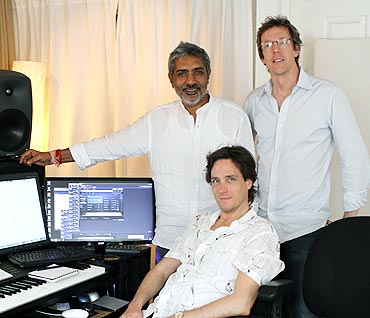
Had you studied Indian music?
Not formally, but mostly from listening to the music. I did study Middle Eastern music. I did other overseas projects. But with India it was maybe a karmic thing.
I know two cinematographers both from Spain and I know other foreign technicians who work on Indian films. But music is a part of the ethos of the culture and the mood of the film itself. Did you have any exposure to India?
I have been India about 12 times, but the first time was with Prakash with Gangaajal. I walked into the set of Gangaajal and went wow. Prakash played the theme of the film on the set to get the actors and the cinematographer in the mood. A lot of guys here especially will do the movie and then say 'Oh now we have to do the music.'
So just a chance meeting and your life has changed with all this work in India.
Yes, the experience has changed my life, changed the way I approach melodies and instrumentation. We have become such an interconnected world. I went to India as a musician and it just changed my perspective. First, it was fun and now I keep getting asked back.
What are you doing these days?
I just finished a reality show. I am doing a song for a Hollywood film called Basmati Blues. It's in English, but with one song sung by Sonu Nigam. He has written the lyrics.